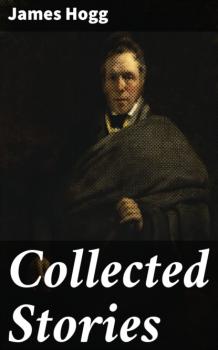James Hogg
Список книг автора James HoggCollected Stories
"Collected Stories" by James Hogg. Published by Good Press. Good Press publishes a wide range of titles that encompasses every genre. From well-known classics & literary fiction and non-fiction to forgotten−or yet undiscovered gems−of world literature, we issue the books that need to be read. Each Good Press edition has been meticulously edited and formatted to boost readability for all e-readers and devices. Our goal is to produce eBooks that are user-friendly and accessible to everyone in a high-quality digital format.
The Three Perils of Man: War, Women, and Witchcraft
This historical novel is set in the Scottish Borders during the reign of Robert II, King of Scots (1371-1390). The story features the English Sir Philip Musgrave who captures Roxburgh castle and is committed to hold it for a specified period to satisfy his mistress Lady Jane Howard. James, Earl of Douglas, takes up a challenge by Robert's daughter Princess Margaret to recapture it within the same period. Sir Walter Scott of Rankleburn assists Douglas indirectly by harassing the English supply chain, to his own advantage. On the other hand, both Jane and Margaret assume male disguise in order to keep an eye on their respective lovers…
The Three Perils of Man: War, Women, and Witchcraft (Vol.1-3)
This historical novel is set in the Scottish Borders during the reign of Robert II, King of Scots (1371-1390). The story features the English Sir Philip Musgrave who captures Roxburgh castle and is committed to hold it for a specified period to satisfy his mistress Lady Jane Howard. James, Earl of Douglas, takes up a challenge by Robert's daughter Princess Margaret to recapture it within the same period. Sir Walter Scott of Rankleburn assists Douglas indirectly by harassing the English supply chain, to his own advantage. On the other hand, both Jane and Margaret assume male disguise in order to keep an eye on their respective lovers…
Assessing Adults with Intellectual Disabilities
This handbook helps professionals working with adults with intellectual disabilities to establish the needs of individuals through systematic assessment and to monitor and evaluate the effectiveness of the service they provide. A comprehensive handbook for professionals working with adults with intellectual disabilities. Enables these professionals to establish the needs of individuals Helps them to monitor and evaluate the effectiveness of the service they provide. Expert contributions include conceptual chapters and descriptions of selected assessment instruments. Covers the full spectrum of need, including adults with mental health difficulties, behavioural problems, forensic needs and assessment of people with profound intellectual and multiple disabilities, and those suspected of developing dementia.
The Private Memoirs and Confessions of a Justified Sinner
James Hogg (1770-1835) was a Scottish author known primarily for his poetry, short stories, ballads, songs and historical narratives. Raised by a tenant farmer in the Ettrick hills of Scotland, Hogg was mostly self-educated, teaching himself to read with only the Bible, and developing an early interest in literature through his mother's recitation of Scottish ballads, songs and fairy tales. Although his 1824 novel, «The Private Memoirs and Confessions of a Justified Sinner», was released to disappointing sales, it was «rediscovered» in 1924 by André Gide and is now recognized as a masterpiece of prose fiction. The «Justified Sinner» of the title is the novel's protagonist, Robert Colwan-Wringham, who as an Antinomian Calvinist is convinced of his own divine salvation, regardless of sin. This complex novel features elements of the Gothic and supernatural, a duel narrative, and has been praised for its sophisticated narrative technique, psychological complexity and elements of irony.
The Private Memoirs and Confessions of a Justified Sinner
James Hogg was a Scottish author known primarily for his poetry, short stories, ballads, songs and historical narratives. Raised by a tenant farmer in the Ettrick hills of Scotland, Hogg was mostly self-educated, teaching himself to read with only the Bible, and developing an early interest in literature through his mother’s recitation of Scottish ballads, songs, and fairy tales. Although his 1824 novel, “The Private Memoirs and Confessions of a Justified Sinner”, was released to disappointing sales, it was “rediscovered” in 1924 by André Gide and is now recognized as a masterpiece of prose fiction. The “Justified Sinner” of the title is the novel’s protagonist, Robert Colwan-Wringham, who as an Antinomian Calvinist is convinced of his own divine salvation, regardless of sin. This complex novel features elements of the Gothic and supernatural, a duel narrative, and has been praised for its sophisticated technique, psychological complexity, and elements of irony.
The Three Perils Of Man
Edited and introduced by Douglas Gifford.
The Three Perils of Man is regarded as Hogg’s most ambitious work of fiction. The book’s extraordinary combination of the fantastic, the funny, the serious and the historically realistic must be unique in literature.
The adventures of its characters, told with the author’s characteristically bold simplicity, are many, mad, and breathtakingly fast. Ranging from Galloway to Northumberland, the main focus of the book is to be found in the Scottish Borders. Hogg knew and loved the Borders well, and the book is full of their oral tradition and local lore. In his attempt to synthesise this material with history, romance and the high literary ideals of his time, Hogg’s nearest modern parallels would be a combination of Tolkien and Iain Banks.
Hogg’s fusion of traditional folklore and innovative style was viewed as an anachronism by his contemporaries, and it is only now that his work is recognised s one of the most original and masterly in the Scottish canon.









